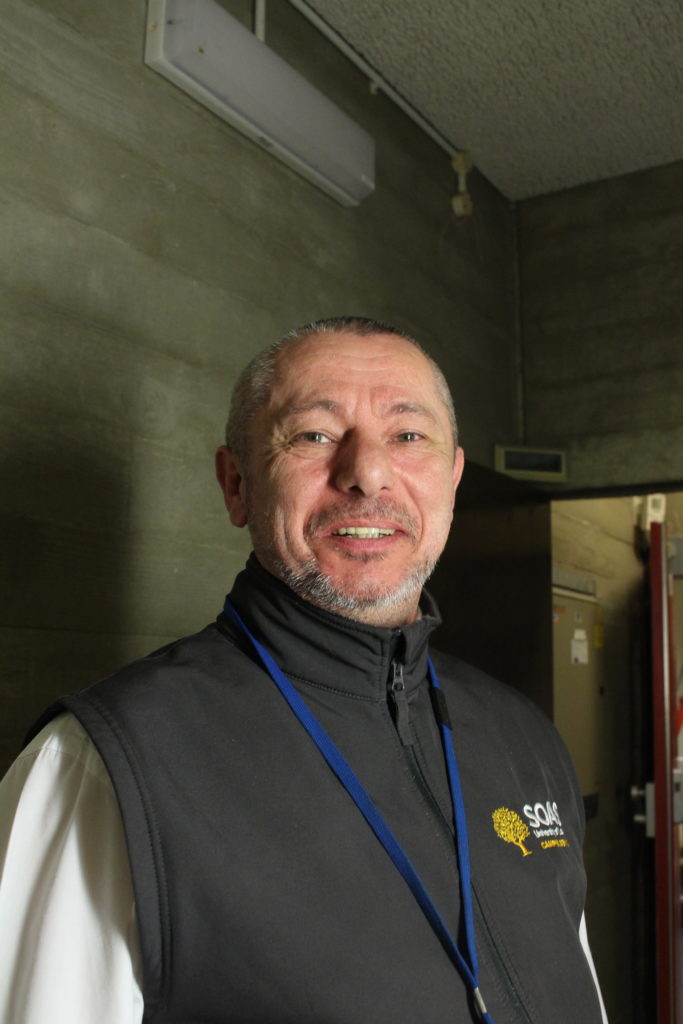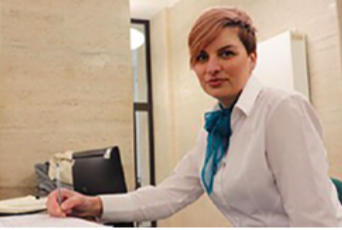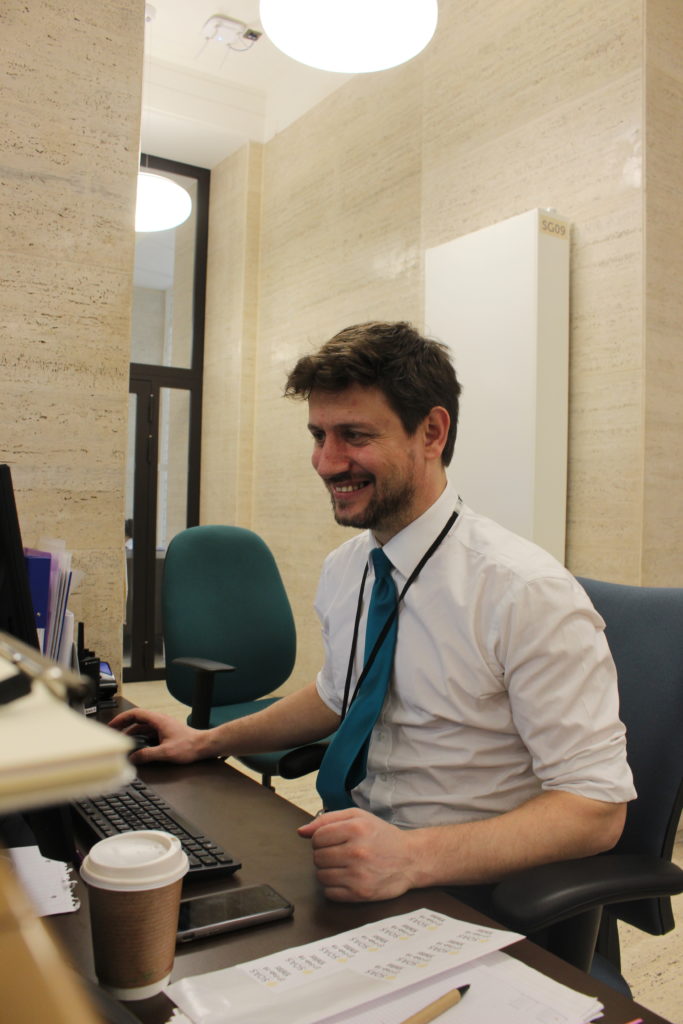Humans of SOAS: Security Guards

Interviewed by Uswa Ahmed, BA World Philosophies
What does the role involve?
Lee: The job is all about looking after people and making sure everyone at SOAS is safe as they go about their day to day things. Oh, and ID checking which is always fun as you can imagine.
Tell us about yourselves. How long have you worked at SOAS and what has made you want to stay this long?
Lee: I’ve worked here for three years. I initially only came here for a month. It was the good people I was working with that’s made me stay this long. The supervisor looks after you. I was also very shocked with how well I got on with the students too. Now they come up to me and tell me “you’re like my big brother” and on their graduation they come back and get photographs with me.

Robert: I’ve been a security guard for ten years. I started as a door supervisor so I used to work at pubs and clubs but that was very dangerous as you can imagine. I used to work at the O2 in Greenwich. The day I decided I was going to give up, there was a brawl with security and the people at the nightclub which has now now subsequently shut down. So I got out of there at the right time. Then I use to work three days a week at Birkbeck with a security company before coming to SOAS.
Ezekiel: I’ve worked here for three years now. I was born in the UK and moved to Nigeria when I was very young. Then I moved back here about fifteen years ago. My father was a sailor and engineer, so we travelled to many countries when I was young. For my undergraduate degree, I studied Sociology and Anthropology. And then I got an MBA in International Business. I came to SOAS three years ago. It was meant to be a means to an end when I was made redundant, but I enjoy it now because of the students. That’s the only reason I think I’ve stayed here so long. I feel there was a purpose for me to come here. I remember one incident when a girl was crying in the corner near the reception because she thought she wasn’t going to graduate but I reassured her that she was here in her final year for a reason and she had put the hard work in to get this far and she could make it. I feel I helped her believe in herself. She was so intelligent but because of how stressful university life is, she felt isolated and anxious . She asked me to mentor her. And I helped her, in the end she got a First. I think that’s why I’m here. Because of the students.
What is your opinion on the ID checking system? Should the barriers be brought back? Why do you think they took the barriers away? Was it a cosmetic issue?
Lee: The ID checking situation is not ideal. People regularly argue about how they’ve been at SOAS for 27 years and ‘how do you still not recognise me?’ But considering the fact that thousands of people walk through those doors every day, we can’t know everybody. I would also strongly argue that the barriers be brought back. Taking into account the volume of people and the speed at which they race through, we can’t even check dates properly.
Robert: Generally, the students are good. But we do get unnecessary situations simply because of the lack of barriers. It’s tough being someone staff/students feel they can deposit their anger for the system on. We are simply doing our job. That’s also where it’s worth mentioning the superiority complex certain staff and students have, where they feel as though they can have a go at us. All we want is respect and you’ll get the same in return but it’s interesting because of the nature of SOAS and what students and staff claim to represent and then I see the ways some, not all, students treat us and there’s is a level of hypocrisy there. I’m just trying to do my job. I’m a human being, treat me like one! If I could tell all those people to stand here for an hour and do what we do and they might understand the difficulty of our situation.
Daniel: Also, bear in mind that some cards look very similar to each other meaning often times we could unknowingly be letting people in with library cards who aren’t even SOAS students in the first place. For example, take the research cards which are almost identical to alumni cards, so this makes our job very difficult.
Robert: Lots of people including myself share that worry that considering the inefficient entry process is the first thing everyone sees, that in turn has a huge impact on what first impression people have of SOAS, it would be in the managements favour to make the entry process into the building more efficient, by bringing back the barriers.
Ezekiel: When we say that the barriers do the job of more than 3 people we mean it. We have complained that this is not going down well but they just haven’t bothered to listen.
What is your opinion on the students? Do you have any interesting stories from over the years? Any fights you’ve had to break up?
Lee: Most of the students are good. I’d say I get on with near enough all of them. And they somehow find me on Instagram. And that’s not even under my real name. There’s some detectives in here. That’s what they should really be studying.
Ezekiel: They are very respectful. They’re not like students from other universities. They are caring. I’ve been to other universities, but I don’t think they can match the culture we have at SOAS.
Lee: In terms of interesting stories, we’ve had students from other universities trying to start a fight downstairs in the bar. One time by the time we got down there, they’d run off because the staff are too late to alert us when something like this happens. They forget it’s our job. I’d say there isn’t much weird stuff in senate house anyway. The main building however is full of weird stuff.
Ezekiel: There are also students at SOAS who really want to talk sometime but they feel very isolated and they have nobody to talk to. As security, I feel you are knowledgeable about the culture around campus. For example, the mistake that I made as a student, like leaving coursework till last minute. I understand they get stressed. But once they can see they have someone to talk to and who understands their stress and believes in them, it gives them a boost. I am just very happy to mentor the students.
What is it like to finally have heating in the main building reception?
Robert: It is fantastic. It’s been a long time coming but I’m glad it’s been resolved finally. If you think about it, the doors are constantly opening in the main building and it gets very cold and feels like you’re sitting outside. Considering the long hours, it can get very difficult especially in the winter, but it has definitely made a difference
Lee: Personally, I was more worried for the students because some of the classrooms are not heated. Because for example, for us we were given these heaters in senate house behind the reception now.
Ezekiel: There was a time in January when I was actually wearing multiple jumpers and an extra jacket and hand warmers just to keep myself warm. But this is a big relief for us now. It took a lot of pushing from students and various groups to push for it but glad we have it now.
What is the one thing you want management to understand
Daniel: getting repairs done.
Lee: They just need to listen to us because we are the guys that are in the buildings, dealing with things first-hand. They should take our opinions on board instead of being dismissive about what we have to say. Don’t get me wrong, sometimes that’s their job and they know best, but they need to understand that we’re the ones who deal with the problems. Also, I would add not being stuck in a building for 12 hours would also help.
Daniel: In addition to that question, we need to be more proactive than reactive in terms of security by having cctv monitors on the front desk for example to stop things before they happen and access control readers to be fixed and to be used properly. The ones we currently have are flimsy and cheap.
Robert: I would add not enough pay for the hours we do. Because it’s a an emotionally and physically demanding job. Our attention can’t be laxed for even a minute.
Do you feel there is a difference in the way staff treat you and students?
Ezekiel: What is funny is that sometimes students are better than staff when it comes to the ID checking issue. Some say ‘I’ve been working here for 20+ years ‘ etc. To those staff members, I would say that you are disrespecting my job. They need to remember that someone has to do the job. It’s especially interesting because most people at SOAS claim to be on top their moral obligation to stand up for others but the first thing they do is disrespect the security staff. Another thing people do to get on your nerves is put passes up to your face on purpose to annoy you. Imagine doing that job all day and getting people disrespect you, calling you names and walk past you. Or when students say that I’m paying x amount of money to study here.
What is your relationship like with other staff?
Lee: It’s literally like one big team. We always have a laugh with each other and are always inviting each other on events. Before the restructuring and bringing the cleaners in-house, everything was a very compartmentalised but now it feels like one big team, ask the cleaners the chefs and the kitchen staff, it’s really nice.
Robert: For me, I’ve been very lucky. When I worked in the Brunei Gallery, the cleaners would come in the morning and I’d interact with them. I also started learning Spanish by interacting with them and that was really nice. And one Friday, one of the cleaners Alonzo, asked me if I’ve ever tried Empanadas. Now, every Friday if I’ve got a couple of quid on me I always treat myself to some of that food. That culture of mutual respect is what I love the most.
You are often the first people anyone gets to see at SOAS. What is that like? What is something the students can do to make your job easier and make your day better?
Lee: It is really nice because sometimes you see people coming in and they look like they’re having a bad day and you give them one smile and it cheers them up. Also, you get to meet different people every day so that makes that job better.
Ezekiel: We are the first people anyone who walks into SOAS interacts with meaning we are at the receiving end of all their feelings and it gets poured onto us. They should assist us and remember we are not trying to pick on anybody. We are all on the same team. We are all family. But I do see that people do discriminate. They forget to treat you as an equal human beings. They feel as though they can decide the level of respect they give you based on the job you do which is very unfortunate especially for a place like SOAS where everyone claims to stand up for others.
Robert: Don’t judge a book by its cover. That’s the phrase everyone throws around at SOAS but you see the way some people interact with us and realise that they selectively putting that into practice. We all deserve respect. I am as entitled to it as any other person in the building. I’ve got kids and I work hard and I deserve to be respected at my workplace.
What makes SOAS unique?
Robert: The diversity of the people I’d have to say. That’s one of the things that make SOAS special. People from All walks of life come here. Its enjoyable to interact with everyone.
Ezekiel: I remember when I first started working here, it was so strange. Everyday there seemed to be a protest.
Lee: I’ve done a couple of shifts at Kings. People there argue more but over sillier things. But SOAS is really unique. Another thing about SOAS that I love is the culture. The company I used to work with before always had a problem with my hair, my facial hair, and my tattoos. It’s nice to work somewhere where people are not bothered by your physical appearance, somewhere it is not a factor that prevents you from getting a job. And you get to see things at SOAS that you never see anywhere else. For example, as you walk through the Building the samba band spontaneously turn up out of nowhere and start playing. It’s little things like that. It is quite cool and good fun too, here anything seems to be possible. Other people stick to the way things are but SOAS isn’t like that.

Loraina (credit: Uswa Ahmed)
Reception:
Loraina: I work in reception with Artur. I’ve been working here since 2016. The students are really lovely. We work with the security staff too. We also have to do with things like lost property. I think that the only criticism I have is that sometimes if there’s events going on in the evening, students can be a bit arrogant. But, overwhelmingly the students are really friendly. I would tell the students to keep this place tidy. And don’t stick stuff everywhere on the walls like posters. But that’s never going to stop so it’s fine. Oh and don’t be late for your classes. Sometimes there are late for the lecture in the rush and they get angry.
Artur: I’ve also been working here since summer 2016. I’d say It’s probably the best job environment I’ve had. I previously worked as a receptionist at a hotel. I’ve never had a bad word for the people at SOAS. Compared to my old job, I came from a very rough work environment at my old job so it’s a nice change. Sometimes the students can be very demanding, but they are generally very friendly.

Artur (credit: Uswa Ahmed)




